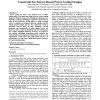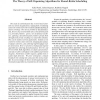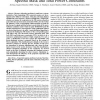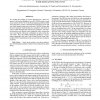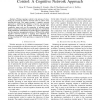245 search results - page 11 / 49 » A low power scheduler using game theory |
125
click to vote
ICCAD
2009
IEEE
2009
IEEE
An efficient wakeup scheduling considering resource constraint for sensor-based power gating designs
14 years 11 months ago
Power gating has been a very effective way to reduce leakage power. One important design issue for a power gating design is to limit the surge current during the wakeup process. N...
108
click to vote
SASO
2007
IEEE
15 years 8 months ago
2007
IEEE
The study of synchronization has received much attention in a variety of applications, ranging from coordinating sensors in wireless networks to models of fireflies flashing in...
146
click to vote
TSP
2010
14 years 8 months ago
2010
Resource allocation problems in multi-user systems, modeled as Nash bargaining (NB) cooperative games, are investigated under different constraints. Using the joint time division m...
140
click to vote
ICASSP
2011
IEEE
14 years 5 months ago
2011
IEEE
We consider the problem of resource allocation for a Direct Sequence Code Division Multiple Access (DS-CDMA) wireless visual sensor network (VSN). We use the Nash Bargaining Solut...
126
click to vote
ICC
2007
IEEE
15 years 8 months ago
2007
IEEE
Abstract— Wireless topology control is the process of structuring the connectivity between network nodes to achieve some network-wide goal. This paper presents a cognitive networ...
